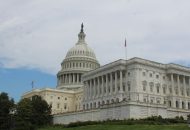Bipartisan Policy Center Digs Into Proposed Tech Antitrust Law

WASHINGTON — The proposed antitrust legislation aimed at large online companies in the Senate hinges on the courts to enforce the potential law to stop big online platforms from self-preferencing by placing their products and services first, which will open up platforms to more competition.
While it looks like the Senate may vote on the American Innovation and Choice Online Act, according to Sen. Amy Klobuchar, D-Minn., experts are divided on the extent the law could be enforced and what next steps could bolster regulators’ authority.
The highly technical nature of the online platforms might hinder enforcement of proposed antitrust laws or at least take years to sort out because much of the enforcement takes place in court, experts warned during an event held Tuesday by the Bipartisan Policy Center.
“These are highly technical issues that I think judges are going to struggle with,” said Diana Moss, president of the American Antitrust Institute. That’s particularly because of the “burden-shifting,” where the defendants — the platforms — will be able to claim privacy, security issues and other technical aspects in their defense.
“These bills are a form of much stronger antitrust enforcement, but we will see how these cases play out and how judges will deal with this burden-shifting framework and the very complex technical arguments that defendants provide them to justify their conduct,” Moss said.
Those potential legal liabilities for platforms will likely take “years for the courts to untangle,” said Alden Abbott, former Federal Trade Commission general counsel and a current senior research fellow at the Mercatus Center.
“All this ambiguity of language is going to create disincentives to improve platforms,” Abbott said, explaining why these laws might hurt consumers.
The bill requires the FTC and Department of Justice to provide guidance that will act as a guardrail helping companies stay in line with the laws, said Bill Baer, the former assistant attorney general for the DOJ’s antitrust division and a current visiting fellow of Governance Studies at the Brookings Institution.
“And any company will have the opportunity to come in and try to convince the enforcement agency, the enforcer, that they satisfy the conditions, the exceptions and the affirmative defenses. And I don’t think the agencies are going to go willy nilly in the court,” Baer said.
The FTC, DOJ and state attorney general will serve as the enforcers, according to the law.
It may make more sense to have a “dedicated sector regulator” in the future, someone who understands how the tech companies work instead of just their market threshold, Moss said.
“It’s almost as if you don’t need market cap thresholds, you need more of a functional description of how companies operate, what their size is, what behaviors they engage in, what are their incentives for exercising market power? I think that’s really what we should be getting at in developing policy solutions,” Moss said.
The digital platforms legislators seek to regulate are distinctly different because often with social media companies in particular, “we don’t pay any money. We pay with our data,” Baer said.
Amazon has particularly pushed its products to the top of its search engine, which could be challenged under the self-preferencing rules and the data collection rules, Baer pointed out.
He contrasted that to Bed, Bath & Beyond’s attempt to ramp up its own generic brand, which failed miserably, he said. However, other brands could have moved their products to other brick-and-mortar stores if the store had succeeded in selling their generic products, he said.
“The challenge here is that these platforms seem to be quite successful at remaining dominant, and therefore there isn’t the ability, unlike Bed, Bath & Beyond, for somebody to move elsewhere. That gives the platform power,” Baer said.
Also, the legislation doesn’t directly tie in data gathered by the platforms and used by platforms’ algorithms to sell products as self-preferencing, Moss said.
“That algorithmic preference-shaping can be used to steer users to preferred products and services. That is self-preferencing. Unfortunately, none of that is referenced in any legislative proposal and, again, this goes to my earlier point of judges getting their heads wrapped around algorithms and how algorithms are constructed to be biased or to be self-preferenced,” she said.
That’s where a dedicated sector regulator is useful in working with antitrust regulators to unpack the technical aspects, Moss said.
“We are not talking about public utility regulation here, we aren’t talking about pricing, profits and entry control. We’re talking about access and creating a level playing field for market participants. That is not a very invasive form of regulation,” Moss added.
Abbott is worried a new regulator would create “bureaucratic squabbling” because it would likely raise tensions between agencies.
And while it would be a “big transition” to have a new regulator, Baer agreed. Current digital products have “a pace of technological change that’s very hard using traditional antitrust rules, traditional privacy rules to keep up with this,” he said.
“So, to have a body with true expertise — able to keep pace [with] these trends to look at where markets may be forming and then quickly tipping — to have rules that may be the best way to channel competition in the tech space,” Baer said.
Madeline can be reached at [email protected] and @MadelineHughes























